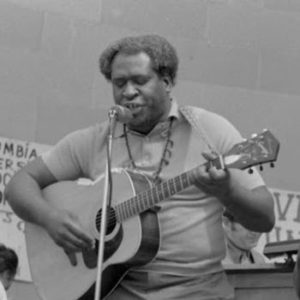
Frederick Douglass Kirkpatrick
*This date in 1933 is celebrated as the birth date of Frederick Douglass Kirkpatrick, a Black Folk musician, activist, and minister.
Named after the abolitionist Frederick Douglass, Kirkpatrick was born in Haynesville, northern Louisiana. His father, John L. Kirkpatrick, was a minister, and his mother died young. He had four sisters and a brother who survived to adulthood. They attended the local segregated schools and church, growing up steeped in gospel and spiritual music. Kirkpatrick learned to play the guitar and sing and began to compose his music. His parents encouraged his education, and he graduated from Grambling University, a historically black college, with a degree in biology.
Kirkpatrick became a Southern Christian Leadership Conference (SCLC) member to work for black civil rights by gathering their churches' power. He ultimately served as director of folk culture for the SCLC. He continued to sing, play the guitar, and write his music. Among his best-known songs was his version of Pete Seeger's "Everybody's Got a Right to Live," described as "an anthem of the civil rights movement." Resistance to racial justice was violent in many areas of the South, including in the industrial mill towns of northern Louisiana.
By the early 1960s, Kirkpatrick was living and working in Jonesboro, Louisiana, a small industrial mill town in the northern part of the state, where CORE members had also been working for civil rights gains. In late 1964, he co-founded the Deacons for Defense and Justice, an armed black self-defense group, in the small industrial mill town of Jonesboro to protect the Black community against white violence in the town of Jackson Parish. The minority of black workers had been in class conflict with whites for years and struggled with oppression under the state's Jim Crow laws. They met challenges differently than rural blacks in agricultural areas, demanding CORE follow their lead.
He was an associate of Rev. Martin Luther King Jr. Beginning in 1968, he recorded three albums with Smithsonian Folkways Recordings. One was a recording of the 1978 Louisiana Folk Fest, an annual event that Kirkpatrick had conceived and regularly hosted to preserve and celebrate musical culture. He used music to teach schoolchildren Black history, including the American Civil Rights Movement. Kirkpatrick was featured singing "Bring 'Em Home" and "Give Peace a Chance" on stage with Pete Seeger at the anti-Vietnam War march and rally on November 15, 1969, in Washington, DC, inspiring an audience of more than half a million. Kirkpatrick moved with his wife to New York City, where he was a Baptist minister.
He and his wife had three daughters and a son, who settled in Grambling as adults. Frederick Douglass Kirkpatrick died on August 16, 1986, at St. Luke's Hospital in New York. He was survived by "his wife, the former Annie Pearl Thompson; his father, the Rev. John L. Kirkpatrick; his stepmother, Arabella; three daughters, Camellia Ann, Alfreda Denise, and Brunella Roanna, and a son, Howard Curtis, all of Grambling; four sisters, Mary Helen Staten of Lafayette, La., Lovie Leola Stakes of Chicago, Lucille Bradford of Midland, Tex., and Mae Faye Hunter of Argo, Ill.; a brother, Robert L. Kirkpatrick of Dallas, and seven grandchildren."